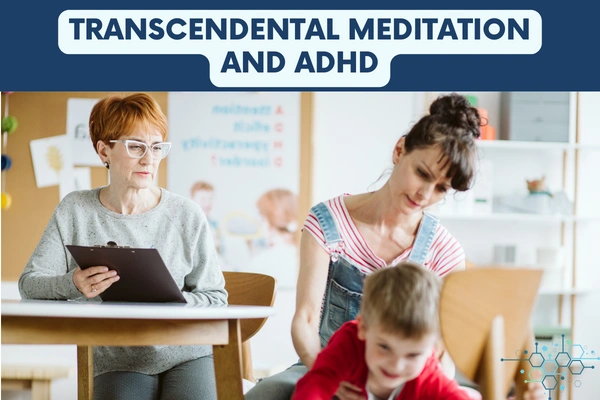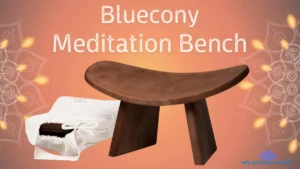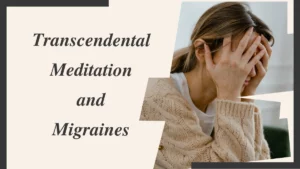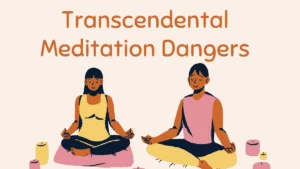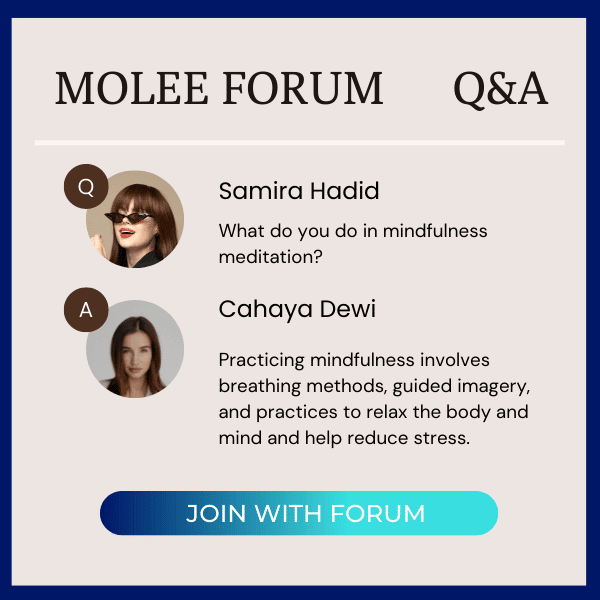Table of Contents
- Understanding ADHD and Its Challenges
- Benefits of Transcendental Meditation (TM) for ADHD
- ADHD, TM, and the Brain
- Practical Tips for Practicing TM with ADHD
- Real-life Impact of Transcendental Meditation on ADHD
- The Effectiveness of Transcendental Meditation and ADHD in Scientific Research
- TM as a Complementary Strategy for ADHD
- FAQs on Transcendental Meditation and ADHD
In the maze that is the mind, ADHD can be like a wild current, changing direction without warning. But there’s hope in Transcendental Meditation (TM)—a practice that brings a moment of peace amid the chaos.
This article explores how Transcendental Meditation and ADHD relate to achieving a steady stream of focus and peace.
We’ll look closely at the science and stories of real people to show how this time-honored practice might open new doors for those dealing with the rough seas of distraction and restlessness.
Get ready to be intrigued by the idea that through regular, calm breathing and quiet moments, we might just find the secret to tapping into the true capabilities of a mind affected by ADHD.
Understanding ADHD and Its Challenges
ADHD, or Attention Deficit Hyperactivity Disorder, is not just about a surplus of energy or a deficit of attention. It’s a complex neuro developmental condition. It shapes how millions process information, manage impulses, and perceive time.
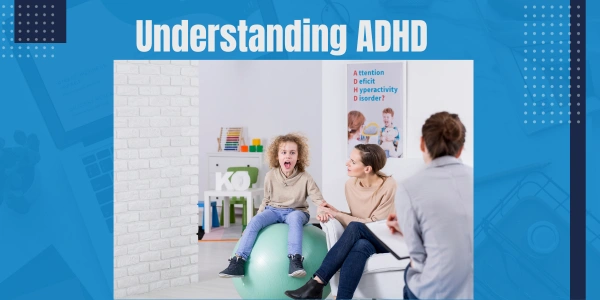
What is ADHD?
ADHD is a neurological condition characterized by persistent patterns of inattention, hyperactivity, and impulsivity. It affects a person’s ability to function or develop in various life areas, including work, school, and relationships.
ADHD’s essence lies not in a lack of focus but in the inconsistent ability to regulate it. Tasks that captivate can absorb attention for hours, yet the mundane can seem insurmountable.
Common Misconceptions About ADHD and Meditation
1. Myth: Meditation requires a still mind—impossible for ADHD.
Fact: Meditation is about returning to the moment, a skill that can be honed, even with ADHD.
2. Myth: People with ADHD are too restless to meditate.
Fact: Meditation can start with movement and gradually lead to stillness.
3. Myth: ADHD is just a childhood issue; adults outgrow it.
Fact: ADHD often persists into adulthood, changing form but not disappearing.
4. Myth: Meditation is a quick fix for ADHD.
Fact: It’s a practice, a tool for managing symptoms, not a cure.
In debunking these myths, we pave the way for a realistic and hopeful exploration of meditation as a complementary approach to ADHD management.
The ADHD Mind: Seeking Stimulation and Serenity
The ADHD mind craves stimulation. It’s a quest for something to click, to engage the gears of focus. This search is not random; it’s a response to an internal need, a neurological call for a certain kind of chemical balance.
What Stimulates the ADHD Mind?
- Novelty: New and exciting experiences can trigger engagement.
- Challenge: Tasks that test skills can captivate attention.
- Interest: Personal passions can lead to hyper focus.
- Urgency: Deadlines can create a focus ‘tunnel’.
But what underlies this quest for stimulation? Often, it’s a dance of neurotransmitters in the brain, notably dopamine and serotonin.
Is ADHD a Result of Low Dopamine or Lack of Serotonin?
- Dopamine: Often lower in ADHD, it’s crucial for motivation and reward.
- Serotonin: Impacts mood, sleep, and memory; its role in ADHD is complex.
ADHD isn’t just a single-note condition; it’s a spectrum of behaviors influenced by the brain’s chemistry. Understanding this can shift how we approach both stimulation and serenity for those with ADHD.
Read our full article on Transcendental Meditation and PTSD Recovery
Benefits of Transcendental Meditation (TM) for ADHD
Transcendental Meditation (TM) offers a reprieve for the ADHD mind. It’s not a panacea, but a practice that can sharpen the blunted edges of focus.
Does TM Help with Focus?
– Yes, by training the mind to return to a single point of reference.
– TM reduces the noise, allowing for longer moments of clarity.
Fixing Low Dopamine in ADHD with TM
– TM may increase dopamine levels, enhancing feelings of reward and motivation.
– Regular practice can recalibrate the brain’s reward system, a boon for ADHD minds.
Benefits of Transcendental Meditation for ADHD
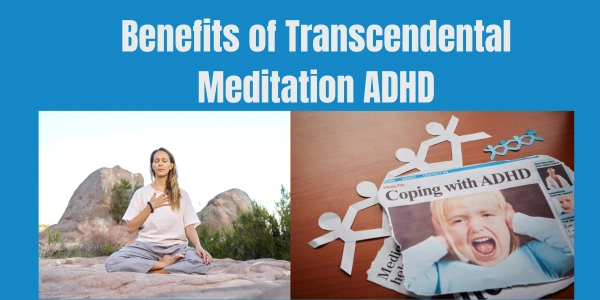
1. Enhanced Focus and Mental Clarity
Transcendental Meditation helps individuals with ADHD by quieting the mental noise, allowing for longer periods of concentrated attention. This practice can lead to clearer thinking and a greater ability to prioritize tasks effectively.
2. Reduced Hyperactivity and Impulsivity
Regular TM practice has been shown to calm the restlessness that is characteristic of ADHD, providing a sense of inner peace that can reduce impulsive behaviors. It offers a natural pause button, giving individuals the space to respond rather than react.
3. Improved Emotional Regulation
TM allows those with ADHD to experience a state of relaxed awareness, which can help in moderating emotional responses. Over time, this can lead to steadier moods and a more balanced outlook on life’s ups and downs.
4. Better Stress Management
By promoting a state of deep relaxation, TM can lower stress levels, which is particularly beneficial for individuals with ADHD who often experience heightened stress. This stress reduction can improve overall well-being and quality of life.
5. Increased Self-Esteem and Confidence
As individuals with ADHD begin to experience the positive effects of TM, such as better focus and calmer reactions, their self-esteem often improves. This boost in confidence can ripple out to all areas of life, from personal relationships to academic or professional achievements.
6. Improved Sleep Patterns
TM can help regulate the overactive mind of someone with ADHD, leading to improved sleep quality. Better sleep not only enhances daily functioning but also contributes to overall health and well-being.
ADHD, TM, and the Brain
TM’s impact on the brain is profound, especially for ADHD.
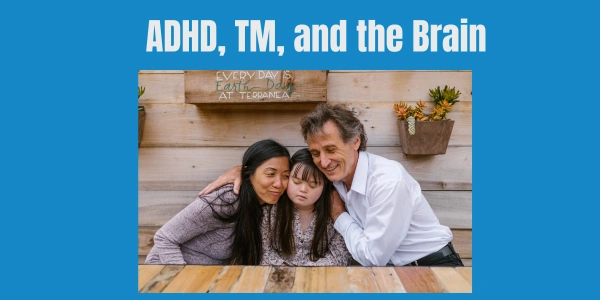
How TM Affects Brain Functioning in ADHD
1. Increases Prefrontal Cortex Activity
The prefrontal cortex, often referred to as the brain’s command center for focus and decision-making, shows increased activity during TM practice. This heightened activity can lead to improved concentration and organizational skills, which are often areas of difficulty for those with ADHD.
2. Reduces Amygdala Response
TM has a calming effect on the amygdala, the brain’s alarm system, which is responsible for the ‘fight or flight’ response. By reducing the amygdala’s reactivity, TM can help individuals with ADHD experience less anxiety and react more calmly to stress, leading to fewer impulsive decisions and reactions.
ADHD and the Brain: Changes Through TM
1. Enhances Neural Connectivity
Transcendental Meditation strengthens the pathways between neurons, particularly in areas of the brain involved in attention and self-regulation. This improved neural connectivity can lead to smoother cognitive processes, allowing for better multitasking and problem-solving abilities in individuals with ADHD.
2. Promotes a State of Restful Alertness
TM encourages a unique state of relaxed awareness, often described as restful alertness. This state is especially advantageous for those with ADHD, whose minds are frequently overstimulated. It provides the benefits of relaxation without drowsiness, which can enhance overall alertness and readiness to engage in various tasks.
In essence, TM can be a gentle yet powerful tool, fostering a more harmonious brain environment conducive to the needs of those with ADHD.
Practical Tips for Practicing TM with ADHD
Meditation with ADHD may seem daunting, but TM can be tailored to meet these unique challenges.
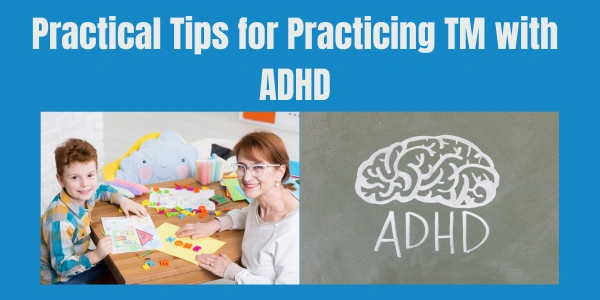
Is it Harder for People with ADHD to Meditate?
- Initially, yes. The restless mind resists stillness.
- Persistence pays. Over time, TM becomes more accessible.
How to do mindful meditation with ADHD?
- Start small. Even a few minutes count.
- Embrace wandering thoughts. Guide them gently back.
- Use cues. A mantra can anchor the mind.
Frequency of TM Practice
- Twice daily is standard.
- Thrice? Only if it feels beneficial and not overwhelming.
Overcoming Obstacles in Meditation with ADHD
Clearing the mind and finding focus can be a hurdle, but not insurmountable.
Clearing the Mind with ADHD
- Don’t aim for emptiness. Aim for awareness.
- When thoughts scatter, patiently herd them back to the present.
Hypnosis and ADHD
- ADHD doesn’t block hypnosis. It may require more skilled guidance.
- TM isn’t hypnosis, but both require a focus that can be mastered.
Deep Breathing and the ADHD Brain
- It’s a natural tranquilizer. Slow breaths soothe the nervous system.
- Deep breathing can be a prelude to deeper meditation.
By adapting TM practices to the rhythms of an ADHD mind, meditation becomes not just feasible but also a refreshing daily retreat.
Real-life Impact of Transcendental Meditation on ADHD
Transcendental Meditation (TM) is more than theory. Its impact on ADHD, especially in the real world, is noteworthy.
TM’s Effect on Students with ADHD
- Improves concentration in class.
- Reduces stress during exams.
- Enhances sleep quality, boosting overall academic performance.
Potential Risks of TM
- Generally safe, but not a standalone treatment.
- May stir up emotions. Guidance is key.
Transcendental Meditation helps students with ADHD.
1. Helps in Managing Impulsivity
Transcendental Meditation provides children with ADHD a moment-to-moment awareness that can interrupt impulsive tendencies. By cultivating a pause before reacting, TM can empower these children to make more deliberate choices, reducing hasty actions that may lead to difficulties in social and academic environments.
2. Aids in Fostering a Longer Attention Span
The practice of TM can gradually extend the duration of focused attention for children with ADHD. This benefit is akin to exercising a muscle; the more the practice is engaged in, the stronger and more sustained the child’s capacity for attention becomes, helping them to stay engaged in tasks and learning activities for longer periods.
3. Offers a Non-Pharmaceutical Tool to Complement Traditional Therapies
TM serves as a complementary approach to conventional ADHD treatments, providing a non-medicinal option that can work in synergy with other therapies. For parents and healthcare providers seeking holistic treatment plans, TM offers a safe and effective method that supports overall child development and well-being without the need for additional medication.
Personal Stories and Case Studies
Meditation is not a quick fix. But, over time, TM allows the brain to create the neural connections that correct the underlying problem. The drug is an immediate fix, but when it wears off, the problem remains—the lack of brain integration.
SARINA GROSSWALD, EDD
Affirmations and ADHD
- Affirmations can reinforce the positive effects of TM.
- They bolster self-esteem, often eroded in ADHD.
Brain Retraining in ADHD
- Neuroplasticity means the brain can adapt; TM supports this process.
- Consistent practice can lead to lasting changes in brain patterns.
These snapshots of TM in action reflect its potential to alter the ADHD experience, providing a complementary approach to conventional treatments.
The Effectiveness of Transcendental Meditation and ADHD in Scientific Research
Recent scientific inquiries have shed light on the potential of Transcendental Meditation (TM) as a supportive tool for individuals grappling with ADHD.
These studies, rigorous in their methodology, seek to understand how TM’s structured approach to mental quietude might benefit the ADHD mind, particularly in areas of focus, executive function, and emotional regulation.
Through empirical evidence, researchers aim to unravel the extent to which this ancient practice can offer modern solutions to those facing the daily challenges of ADHD.
1. Use of the Transcendental Meditation Technique to Reduce Symptoms of Attention Deficit Hyperactivity Disorder (ADHD) by Reducing Stress and Anxiety: An Exploratory Study
This exploratory study [1] investigates the feasibility of using the Transcendental Meditation (TM) technique to alleviate symptoms of ADHD in children by reducing stress and anxiety. It involves students aged 11-14 who practiced TM twice daily and were evaluated for changes in ADHD symptoms and executive function.
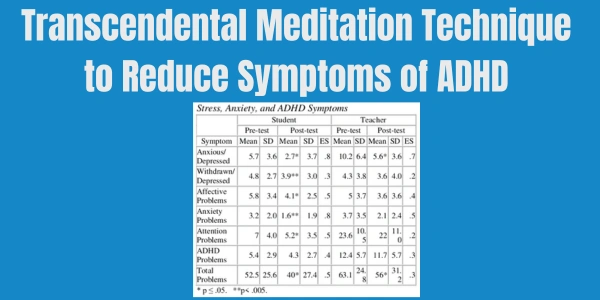
Background of study:
ADHD is a prevalent condition affecting school-aged children, often complicated by other disorders such as anxiety. With concerns about the long-term effects and efficacy of ADHD medications, there is a growing need for effective non-drug interventions. This study explores the potential of TM as a stress-reducing practice that could improve ADHD symptoms and executive function in children.
The method used:
The study employed a pretest-posttest design with a single cohort of students diagnosed with ADHD. Participants, aged 11-14, practiced TM twice daily at school. Data collection included ADHD inventories and performance measures of executive function, administered at baseline and after three months.
Results of study:
The results indicated statistically significant reductions in stress, and anxiety, and improvements in ADHD symptoms and executive function. Specific numbers or statistical data were not provided in the extracted content, but the overall findings suggest that TM practice was beneficial for the participants.
The study concluded that the practice of TM could be a feasible non-drug intervention for reducing ADHD symptoms in children. By reducing stress and anxiety, TM practice showed promise in improving executive function and behavior, indicating its potential as a complementary approach to managing ADHD.
2. ADHD, Brain Functioning, and Transcendental Meditation Practice
The study [2] examines the effects of Transcendental Meditation (TM) practice on brain functioning and task performance in students with ADHD. It aims to determine if TM can serve as a non-drug treatment to improve symptoms and executive functions in ADHD individuals.
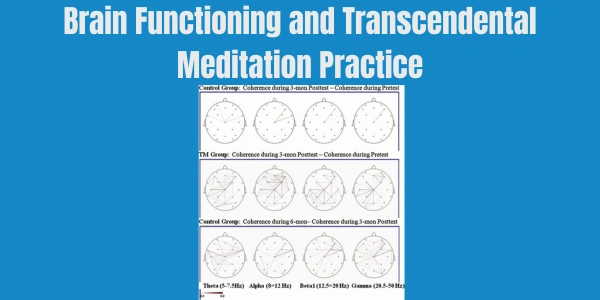
Background of study:
ADHD is characterized by symptoms of inattentiveness, impulsivity, and hyperactivity, affecting about 8% of children. The study explores the potential of TM to address ADHD symptoms by influencing brain activity, particularly given the limitations and side effects associated with standard ADHD medications.
The method used:
The research was a random-assignment pilot study with 18 ADHD students aged 11-14. They were pretested, assigned to TM or delayed-start groups, and post-tested at 3- and 6-month intervals. The TM group practiced TM twice daily, and their brain wave patterns and task performance were measured.
Results of study:
After three months of TM practice, there were significant decreases in theta/beta ratios and increases in theta coherence, suggesting improved brain activation and communication.
Additionally, there was a trend for increased alpha and beta1 coherence, and improved performance on the Letter Fluency test. These changes were also observed in the delayed-start group after they began TM practice.
The study concludes that TM practice could be a viable non-drug intervention for ADHD, with observed benefits in brain functioning and task performance. The findings suggest that TM may help reduce ADHD symptoms and improve executive functions, warranting further research.
References:
- Grosswald SJ, Stixrud WR, Travis F, Bateh MA. Use of the Transcendental Meditation technique to reduce symptoms of Attention Deficit Hyperactivity Disorder (ADHD) by reducing stress and anxiety: An exploratory study. Current Issues in Education. 2008;10(2):online link
- Travis, Frederick & Grosswald, Sarina & Stixrud, William. (2011). ADHD, Brain Functioning, and Transcendental Meditation Practice. online link
TM as a Complementary Strategy for ADHD
In conclusion, the convergence of scientific research on Transcendental Meditation (TM) presents it as a beacon of hope for those navigating the turbulent waters of ADHD. While not a cure, TM emerges as a potent adjunctive practice, offering a semblance of inner peace and enhanced cognitive functioning.
The evidence suggests that TM can be particularly effective in reducing stress and anxiety, which are often companions of ADHD, and in improving the core executive functions that are typically challenging for individuals with this condition.
With its non-invasive nature and absence of side effects, TM stands out as a valuable component in the multifaceted approach to ADHD management. As research continues to evolve, it becomes increasingly clear that TM holds a unique place in the ADHD therapeutic landscape, promising a path to greater focus and mental clarity for those who practice it consistently.
Read our full article on Transcendental Meditation and Cardiovascular Health.
FAQs on Transcendental Meditation and ADHD
Can Transcendental Meditation help with ADHD?
Yes, Transcendental Meditation can aid in managing ADHD by enhancing focus and reducing stress and hyperactivity.
Is ADHD low dopamine?
ADHD is associated with lower dopamine levels, which affects attention and impulse control.
Can people with ADHD practice mindfulness?
Individuals with ADHD can practice mindfulness to improve concentration and emotional regulation.
What meditation is good for ADHD?
Mindfulness-based meditation and Transcendental Meditation are beneficial for individuals with ADHD, promoting calmness and focus.
How do I clear my mind of ADHD?
Techniques like Transcendental Meditation can help clear the mind and reduce the symptoms of ADHD.


